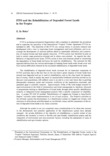ITTO and the Rehabilitation of Degraded Forest Lands in the Tropics
JIRCAS international symposium series
| ISSN | 13406108 |
|---|---|
| 書誌レコードID(総合目録DB) | AA1100908X |

本文フルテキスト
intlsymp-1_10-19.pdf369.09 KB
ITTO is an Intergovernmental Organization with a mandate to administer the provisions and to supervise the operation of the International Tropical Timber Agreement (ITTA) established in 1983. The objectives of the ITTA are, among others, to promote research and development with a view to improving forest management and wood utilization, and to encourage the development of national policies aimed at sustainable utilization and conservation of tropical forests and their genetic resources. ITTO's action may therefore be seen as both in certain cases prevention-oriented and in others cure-oriented. As regards the rehabilitation of degraded forest lands, ITTO's action is first and foremost aimed at minimizing the degradation of forest lands and hence the need for rehabilitation. The rationale for this approach derives from the various advantages of keeping forest lands under forest cover and from serious difficulties inherent in the successful rehabilitation of degraded forest lands.
The rehabilitation of degraded forest lands accounts for an important component of ITTO's activities due to the fact that on the one hand a great expanse of forest lands have already been degraded and are in need of rehabilitation, and on the other hand, the degradation of forests, which is mainly the result of unsustainable livelihood activities carried out, by the poor rural populations, will unlikely come to an end in a very near future due to growing demographic pressures, social and economic conditions of the populations concerned, and persistent gaps in scientific research. Approximately 13.8% of the total budget secured for approved projects in the field of reforestation and forest management is, therefore, allocated to programmes relating to rehabilitation of forest lands, through either specific rehabilitation projects, or integrated forest management projects with a specific component of rehabilitation. A project PD 2/87 (F) entitled "Rehabilitation of Logged-over Forests in Asia/Pacific Region" currently under implementation is one of such projects. The Project's activities so far initiated, concern the development of a classification system for logged-over forests, with relevance to silvicultural activities based on eco-floristic zones, and the assessment of the extent of degraded forest lands in six Asian countries.
Although the project is not yet completed, some considerations to be taken into account in the development and potential application of the classification system have already emerged: the precise definition of the objective of rehabilitation, a careful review of site conditions, the necessity to evolve a flexible and user-friendly classification system and the integration of environment and socio-economic factors, including the assessment of costs of rehabilitation and agro-forestry options.
The rehabilitation of degraded forest lands accounts for an important component of ITTO's activities due to the fact that on the one hand a great expanse of forest lands have already been degraded and are in need of rehabilitation, and on the other hand, the degradation of forests, which is mainly the result of unsustainable livelihood activities carried out, by the poor rural populations, will unlikely come to an end in a very near future due to growing demographic pressures, social and economic conditions of the populations concerned, and persistent gaps in scientific research. Approximately 13.8% of the total budget secured for approved projects in the field of reforestation and forest management is, therefore, allocated to programmes relating to rehabilitation of forest lands, through either specific rehabilitation projects, or integrated forest management projects with a specific component of rehabilitation. A project PD 2/87 (F) entitled "Rehabilitation of Logged-over Forests in Asia/Pacific Region" currently under implementation is one of such projects. The Project's activities so far initiated, concern the development of a classification system for logged-over forests, with relevance to silvicultural activities based on eco-floristic zones, and the assessment of the extent of degraded forest lands in six Asian countries.
Although the project is not yet completed, some considerations to be taken into account in the development and potential application of the classification system have already emerged: the precise definition of the objective of rehabilitation, a careful review of site conditions, the necessity to evolve a flexible and user-friendly classification system and the integration of environment and socio-economic factors, including the assessment of costs of rehabilitation and agro-forestry options.
| 作成者 | E.ZE Meka |
|---|---|
| 公開者 | Japan International Research Center for Agricultural Sciences |
| オンライン掲載日 | |
| 号 | 1 |
| 開始ページ | 10 |
| 終了ページ | 19 |
| 言語 | eng |
